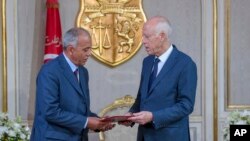Tunisia's designated prime minister Habib Jemli expects to pull together a new coalition government next week after an election in October produced a fractured parliament.
Economists say a strong government with a clear economic vision is essential to continue efforts to stabilize state finances and address the frustrations, which threaten to undermine trust in the young democracy's politics.
How bad are the numbers?
Economic growth, averaging 4.7% in the decade to 2010, has averaged 1.8% since then, World Bank figures show.
The uprising hit Tunisia's tourism industry and created intense pressure for the new democracy to create public sector jobs, raise pay and increase subsidies.
Tunisia recorded a primary surplus in 2010, with a net deficit of just 1%. Since then, government debt has climbed from 41% of gross domestic product to more than 70%.
The government expects a deficit this year of 3.9% of GDP, down from 7.4% of GDP in 2016, 6% in 2017 and 4.5% last year.
The national current account declined, foreign currency reserves fell, the exchange rate for the dinar dropped and inflation rose to more than 7% in 2017, and was still 6.5% in September.
Impact on Tunisians
Unemployment, 12% before the revolution, is now 15% nationally but far worse in Tunisia's impoverished interior, where it exceeds 30% in some cities.
Tourism was just starting to recover in 2015 when militants killed scores of foreign visitors in two attacks, sending the sector back into collapse.
Visitor numbers only returned to their earlier levels this year but the collapse of Thomas Cook in September showed how vulnerable Tunisia remains to any sudden shock in the sector.
What are the other problems?
A sudden surge in hiring by state-owned companies after the revolution contributed to a steep decline in both their performance and profitability. Their losses cost the government $2 billion last year.
The state phosphate company contributed 10% of Tunisian exports before 2011 but only 4% now. It is located in a poor region and the post-revolution government increased its workforce by 21,000 people to 30,000.
Tunis Air, which has 8,000 staff for only 27 planes, has seen losing money since the revolution. It said last week it could lay off 400 jobs next year.
However, the powerful UGTT union has resisted many such reforms and says other problems such as corruption and mismanagement should be addressed first.
Well-connected private businesses also dominate in some sectors, acting like cartels and leaving smaller businesses unable to raise financing for investment, diplomats say.
What has the state tried so far?
Tunisia is half way through a $2.8 billion International Monetary Fund (IMF) loan program, which began in 2016.
The IMF required the government to rein in spending, especially on public sector wages, which doubled in cost to about 16 billion dinars ($5.5 billion) in 2018 from 7.6 billion dinars in 2010, and on subsidies.
Its fuel price rises in March were the fifth in a year, and increases are expected to resume.
However, the spending cuts, though adding to the public frustrations that led voters to punish coalition partners in October's election, failed to meet deficit reduction targets.
What next?
The foreign lenders who finance Tunisia's deficit expect it to deepen its spending cuts - an unpopular and potentially difficult process for the next coalition government.
However, any structural reforms to reduce bureaucracy, improve the performance of government departments and services, and cut corruption would strengthen the business climate and could raise income.
President Kais Saied, an independent elected in October, has already pushed several anti-corruption programs, something that could help the new government win support for less appealing policies.





